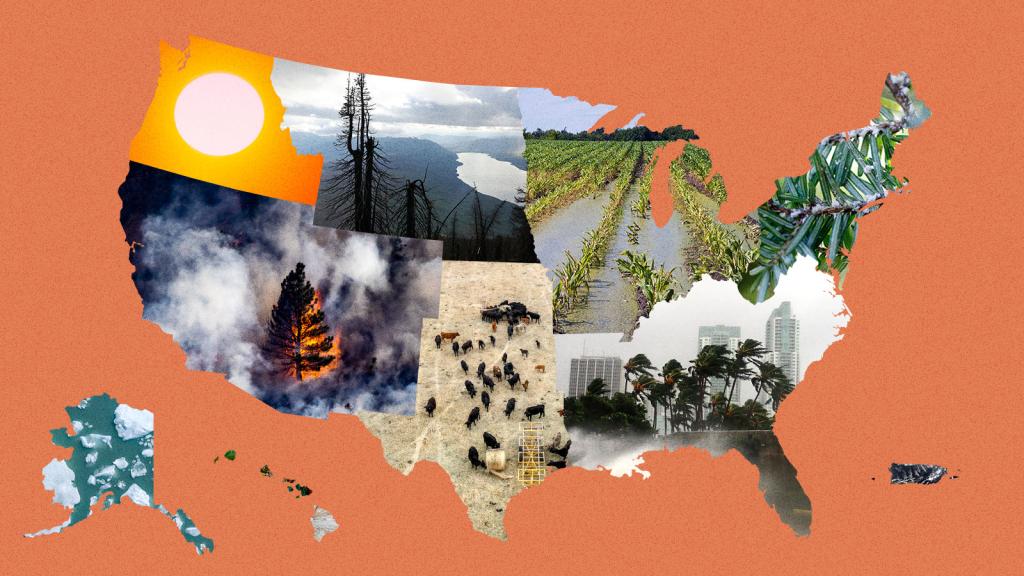The United States and China agreed to “sufficiently accelerate” the deployment of clean energy and boost global production of renewables in a bid to begin displacing fossil fuels and address the climate crisis.
Their joint announcement on Tuesday* included a commitment by the world’s two largest polluters to meaningfully reduce greenhouse gas emissions within the decade in an effort to keep global temperature increase to 1.5 degrees Celsius (2.7 degrees Fahrenheit). To achieve that, the two countries pledged to ramp up their use of solar, wind, and battery storage through the end of 2030 to reduce their dependence on coal, oil, and gas. They also aim to triple renewable energy capacity worldwide in the same time frame.
“The United States and China recognize that the climate crisis has increasingly affected countries around the world,” the Sunnylands Statement on Enhancing Cooperation to Address the Climate Crisis states. Both countries said they would “rise up to one of the greatest challenges of our time for present and future generations of humankind.”
That lofty promise came just hours before presidents Joe Biden and Xi Jinping were to meet in San Francisco for the Asia-Pacific Economic Cooperation summit. More significantly, it comes two weeks before the annual United Nations climate talks known as COP28 brings representatives from nearly 200 countries to Dubai. An agreement by the U.S. and China to take steps to mitigate climate change could help shape the gathering’s outcome.
“This lays the foundation for the negotiations in Dubai,” David Sandalow, a former Clinton and Obama administration official and a fellow at Columbia University’s Center on Global Energy Policy, told The New York Times. “It sends a strong signal to other countries that this language works, and more broadly that differences can be overcome.”
Li Shuo, incoming director of the China Climate Hub at the Asia Society, told Reuters the relationship between the two countries is “a precondition for meaningful global progress” and said the pact would help “stabilize the politics” between two geopolitical rivals. “The Sunnylands statement is a timely effort of aligning the United States and China ahead of COP28,” he said.
Nothing in the statement specifies how, or when, China will phase out its use of fossil fuels to generate electricity, let alone stop building coal-fired power plants. Still, the country has been expanding its use of renewable energy faster than any other, and the International Energy Agency predicts China’s use of coal could peak next year, then dwindle in coming years.
Sandalow told the Times that the efforts described in the Sunnylands agreement would allow China and the U.S. to share knowledge as they bring more renewables online and invest in energy storage and improved transmission. “In my experience, neither the U.S. government nor the Chinese government make high-profile statements like this unless there are serious plans to implement the agreement,” he said.
Although the United States is, historically, the world’s largest emitter of planet-warming gasses, China currently ranks first. For the first time, China stated its intention to control the emission of all greenhouse gasses, not just CO2, in its 2035 national climate plan. Last week, it offered a blueprint for reducing methane emissions, though the drew widespread criticism for lacking firm targets.
The Sunnyland agreement also lacks targets, but says the two countries will work together to set them. Both nations also agreed to resume a working group on climate cooperation and outlined other areas where they can collaborate, including sharing information on climate policies and technologies, curbing deforestation, and reducing plastic pollution.
The Sunnylands agreement, released separately by the U.S. State Department and China’s Ministry of Ecology and Environment, followed several days of meetings between U.S. climate envoy John Kerry and his Chinese counterpart Xie Zhenhua. It’s named for the Sunnylands retreat in California where the two met earlier this month
Manish Bapna, president of the Natural Resources Defense Council, praised the accord in a statement and called it “a powerful message of cooperation on the existential challenge of our time” ahead of COP 28. “It sets a foundation of ambition going into global climate talks in Dubai,” he said. “Today’s agreement provides the urgent multilateral commitment we need — and not a moment too soon.”
*Correction: This story originally misidentified the day of the announcement.



